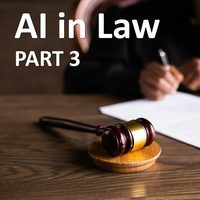 You’ve heard about Artificial Intelligence, AI Agents, and Agentic AI. But what about today? What can AI actually do for a law firm—safely, ethically, and effectively? Here’s a grounded, plain-English look at the practical ways modern AI can lighten your workload, improve accuracy, and keep your focus where it belongs: on your clients.
You’ve heard about Artificial Intelligence, AI Agents, and Agentic AI. But what about today? What can AI actually do for a law firm—safely, ethically, and effectively? Here’s a grounded, plain-English look at the practical ways modern AI can lighten your workload, improve accuracy, and keep your focus where it belongs: on your clients.
First Things First: AI Is a Tool, Not a Replacement
Let’s start here: AI doesn’t replace lawyers. It replaces tedium—the repetitive, non-billable tasks that quietly eat into your day.
Think of it as your digital paralegal: smart, fast, tireless, and always available.
Used well, AI gives you clarity, consistency, and calm.
Used carelessly, it can risk confidentiality or accuracy.
The secret is knowing where it fits—and where it doesn’t.
- Summarizing and Organizing Information
AI can scan long documents, discovery files, or email chains and return a clean summary that hits the key points.
Safe ways firms are using this today:
- Summarizing meeting notes or client intake forms.
- Condensing discovery materials into bullet-point outlines.
- Extracting key deadlines or action items from case updates.
Pro Tip: Never paste client-confidential content into a public AI tool (like ChatGPT’s free version). Use secure, firm-approved systems or AI tools that guarantee data privacy.
- Drafting First Passes of Routine Documents
AI shines at creating starting points—drafts of client letters, checklists, or policies that you can review and refine.
Examples:
- Drafting a polite payment reminder or client update email.
- Generating a first version of an engagement letter.
- Producing plain-English explanations of complex legal terms for clients.
It’s like having an extra set of hands to get you past the blank page. You’re still the expert—the AI just gives you a head start.
- Managing Tasks and Deadlines
Modern legal tech tools (many powered by AI) can track case deadlines, court filings, and even billing reminders.
Some can now “learn” your firm’s patterns and prompt you before a deadline is missed or a billing entry goes stale.
Why this matters:
- Reduces the mental load of juggling tasks.
- Cuts down on human error.
- Keeps your calendar and caseload in sync across devices.
Think of it as your digital project manager—quietly watching your back.
- Strengthening Cybersecurity and Compliance
AI tools now monitor your systems for suspicious activity 24/7—something no human can do alone.
They can spot unusual logins, phishing attempts, or data leaks in real time and trigger automatic protections.
Real-world examples:
- Blocking a malicious email before anyone clicks.
- Detecting an employee login from a strange location.
- Alerting your IT team instantly if sensitive data moves outside secure folders.
That’s not theoretical—that’s AI protecting your reputation, your clients, and your license.
- Helping with Research and Continuing Education
AI can summarize case law trends, locate statutes, or explain complex rulings in plain English.
It’s not a replacement for Westlaw or Lexis, but it can supplement your reading—helping you spot relevant ideas faster.
Examples:
- Turning a long article into a 3-paragraph overview.
- Explaining the difference between two legal doctrines in simple terms.
- Suggesting follow-up topics for CLE study.
Used wisely, it’s like having an endlessly patient study partner who never needs coffee.
The Ethics Rule of Thumb
Remember this simple rule:
You can delegate work to AI, but not responsibility.
AI can help draft, organize, or analyze—but you must still verify, edit, and approve.
Just like you’d review a paralegal’s work before filing, you must do the same with AI output.
For law firms, that’s not just best practice—it’s compliance with ABA Model Rule 1.6(c) (reasonable efforts to protect client information).
The Bottom Line
You don’t need to wait for the future to use AI wisely.
It’s already here, quietly making smart lawyers more efficient—and more secure—every day.
Used with good judgment and trusted partners, AI can:
✅ Reduce stress.
✅ Increase accuracy.
✅ Protect your firm’s reputation.
✅ Give you back the time and focus you’ve been missing.
Want to Explore Safe AI for Your Firm?
If you’re curious about which AI tools are secure, compliant, and actually useful for small to mid-sized law firms—we’d love to show you.
Our Siouxland legal IT team specializes in helping firms use modern technology confidently, without risking client trust.
Let’s talk about what AI can do for you—safely, simply, and on your terms.
Previous: AI Agents vs. Agentic AI: What’s the Difference (and Why It Matters to Law Firms)
Next: The Ethics of AI in Law — What You Can (and Can’t) Do Under the Rules


